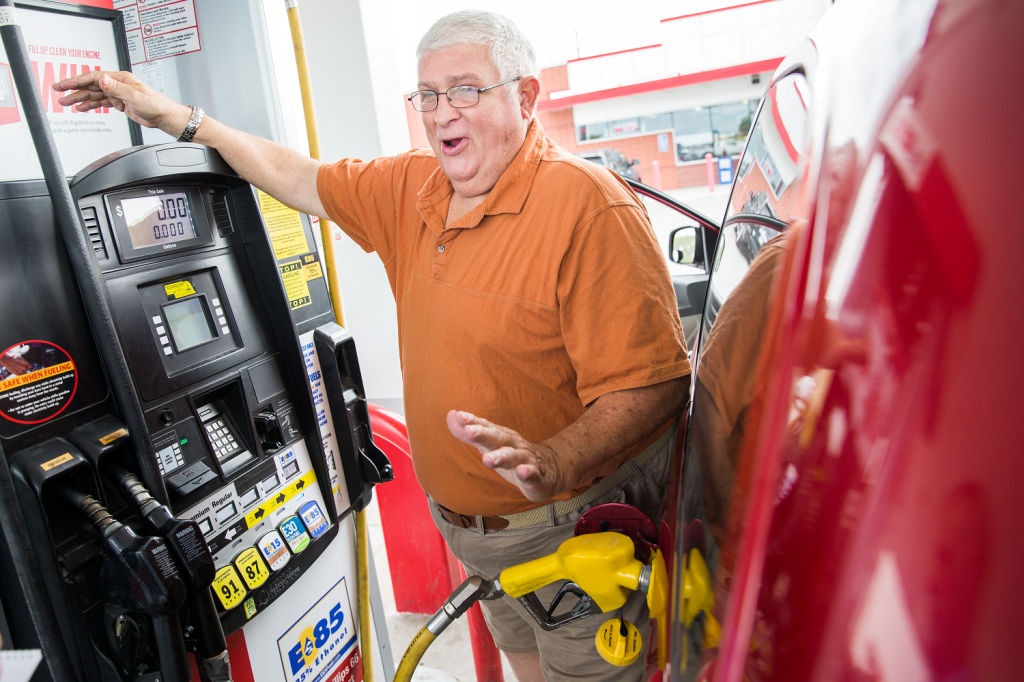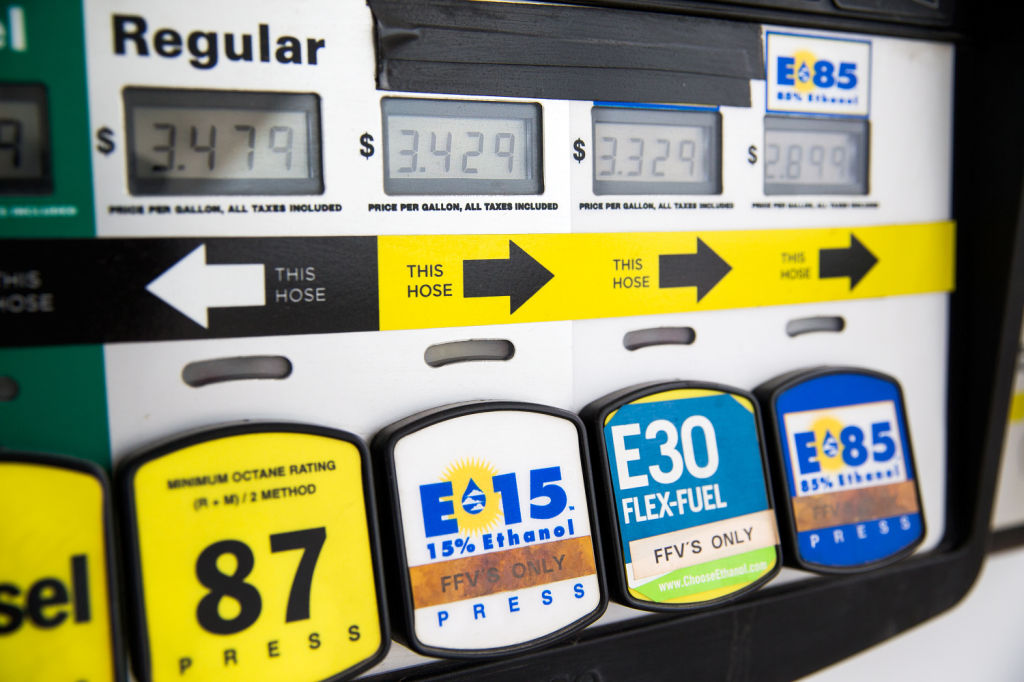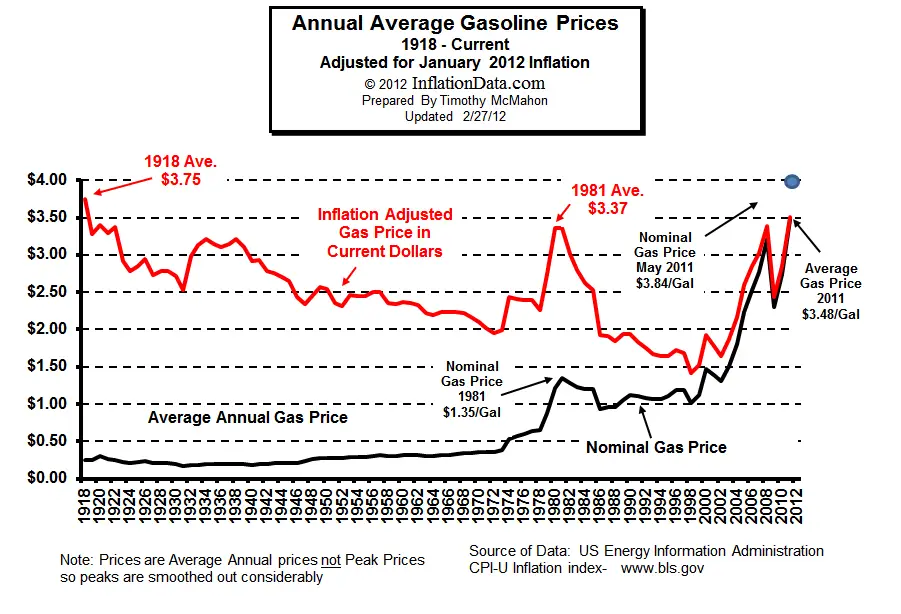General Discussion
Related: Editorials & Other Articles, Issue Forums, Alliance Forums, Region ForumsLower prices the selling point for gas with higher ethanol content, but questions remain
http://www.omaha.com/money/lower-prices-the-selling-point-for-gas-with-higher-ethanol/article_b2576f61-39bf-53ed-88b1-245f9cae2b21.html

BRENDAN SULLIVAN/THE WORLD-HERALD
Mick Pierce, who drives his 14 grandchildren to activities across Lincoln, uses gasoline containing 85 percent ethanol in his Dodge Grand Caravan. He said higher-blend ethanol saves him money and “is the right product for me.” Pierce’s minivan is a newer flex-fuel vehicle that can accommodate high mixes of ethanol with clear gas.
POSTED: WEDNESDAY, JULY 16, 2014 1:00 AM
By Russell Hubbard / World-Herald staff writer
At a U-Stop gas station and convenience store in Lincoln last week, the pumps dispensing gasoline with 15 percent, 30 percent and 85 percent ethanol attracted a steady of stream of customers who have embraced blends higher than the E10 that has become a fixture at the nation’s fueling stops.
Higher-blend ethanol “is the right product for me,” said Mick Pierce, who was gassing up his minivan with E85. “I have 14 grandkids with sports and activities from southwest Lincoln to northeast Lincoln, so it saves me a little money.”

BRENDAN SULLIVAN/THE WORLD-HERALD
Motorists with flex-fuel vehicles can fill their tanks with gasoline containing 15, 30 or 85 percent ethanol at the Phillips 66 U-Stop gas station in Lincoln.
The savings were more than decent. Pierce’s E85 cost $2.89 a gallon, versus $3.47 for E10. On a 15-gallon fill-up, that works out to almost $9. Done weekly, that’s almost $40 a month.
A straightforward appeal to the consumer pocketbook is emerging as the chief strategy of an ethanol industry facing uncertain government mandates. Gasolines mixed with higher blends of ethanol are going to be required if the goal is to get more renewable fuels into U.S. vehicles, according to industry representatives in Nebraska, the second-largest producer of the motor fuel, and the third-largest of its main ingredient, corn.
FULL story at link.
Jacoby365
(451 posts)My girlfriend has a flex-fuel Chrysler Town & Country van, and her mpg drops by 5 with E85 fuel. The net result is that it costs her more money to use E85. It costs less to fill the tank, but in the long run, it will cost more to use E85 all the time. Here are the results of a similar test: http://www.edmunds.com/fuel-economy/e85-vs-gasoline-comparison-test.html.
madokie
(51,076 posts)and figured the cost as miles per dollar. I can't remember exactly what the figures were but it cost more to use the cheaper at the pump E85 plus the car wasn't as responsive on it as it is the regular. Regular with no ethanol was the best.
Omaha Steve
(99,632 posts)From the link: For us, the E85 trip was about $30 more expensive — about 22.9 cents per mile on E85 versus 18.7 cents per mile with gasoline.
I've used E-85 when I could. So far only in rental cars since don't own a flex car. It's not all just MPG/cost. We use a lot LESS non-renewable oil.
I've burned E-10 since the 70's in over a dozen vehicles without any problems either.
OS
librechik
(30,674 posts)Spider Jerusalem
(21,786 posts)because of ethanol subsidies. You're paying for it in your taxes, though.
Omaha Steve
(99,632 posts)Remember the oil company subsidies? Why shouldn't renewable have subsidies too?
http://ourfuture.org/20120326/Gas_Prices_Have_Been_Rising_For_a_Decade_Why_Keep_Subsidizing_Big_Oil?gclid=CLb_2fKIyr8CFRAV7AodzR4AYw
MARCH 26, 2012
Bill Scher
While the volatile price of gas can give you whiplash and screw up household and business budgeting, the fact is the price of gas has been steadily rising since 2002. It only took a break in 2008 after the global financial crisis shattered economic demand.

During this decade of increasing gas prices — largely driven by increasing demand and dwindling supply — and increasing oil company profits, we in America have continued to reliably subsidize oil companies with our taxpayer dollars. Meanwhile, we have not been as reliable or as robust with our subsidies to renewable energy alternatives.
So when gas prices go up, many Americans don’t have a choice but to pay it. This is called dependence, not capitalism.
Before today’s Senate vote on whether to repeal these oil subsidies, the oil industry lobbyists have launched an ad campaign to try to convince you that if we take away their free ride, our prices will go up even more.
FULL story t link.
Spider Jerusalem
(21,786 posts)At best it's an energy carrier--the return on energy investment for corn ethanol is close to 1; see here: http://netenergy.theoildrum.com/node/6760
And at a time of increasing environmental feedback from climate change affecting agriculture, significant drought, and other challenges, devoting +/-50% of the US corn crop to ethanol production doesn't seem like the wisest thing to be doing.
Omaha Steve
(99,632 posts)Distillation only removes the starch. The mash co-product is used as a vegetarian high protein with low cost feed for cattle, hogs, fowl, etc. Even though meat prices are up, ethanol helps keep them from going even higher.
http://www.extension.umn.edu/agriculture/beef/components/docs/feeding_corn_distillers_grains_to_beef_cattle_sdsu.pdf
Spider Jerusalem
(21,786 posts)while feeding fewer people than the corn would have done as corn instead of cattle feed. I don't see how this is a positive, necessarily?
Omaha Steve
(99,632 posts)You can have my grill when you pry it from my cold dead hands.
Spider Jerusalem
(21,786 posts)US meat consumption per capita has increased by over 50% since 1961 (from around 90kg per person per year to around 140). Over the same period, per capita meat consumption in the UK has increased from around 70kg per person per year to around 80kg. No need to give up meat, but not necessary to consume so much of it either.
Omaha Steve
(99,632 posts)Even fruit and vegetable crops contribute to the earths decline through chemicals etc.
Marta and I bought a share in an Organic Crop Improvement Association this year (http://www.iowanafarm.com/) to do our part on that. But meat will always be a large part of the US diet.
Dropping corn for ethanol will drop the price of corn, and farmers will just shift to another crop to compensate.
Ethanol from switch grass is fine with me. I posted this last Sept: http://www.democraticunderground.com/10023724058

IDemo
(16,926 posts)The U.S. government's rush to produce corn-based ethanol as a fuel alternative will worsen pollution in the Gulf of Mexico, increasing a "Dead Zone" that kills fish and aquatic life, according to University of British Columbia researcher Simon Donner.
In the first study of its kind, Donner and Chris Kucharik of the University of Wisconsin quantify the effect of biofuel production on the problem of nutrient pollution in a waterway.
The researchers looked at the estimated land and fertilizer required to meet proposed corn-based ethanol production goals. Recently, the U.S. Senate announced its energy policy aims of generating 36 billion gallons annually of ethanol by the year 2022, of which 15 billion gallons can be produced from corn starch. The corn-ethanol goal represents more than three times than triple the production in 2006.
"This rush to expand corn production is a disaster for the Gulf of Mexico," says Donner, an assistant professor in the Dept. of Geography. "The U.S. energy policy will make it virtually impossible to solve the problem of the Dead Zone."
http://www.sciencedaily.com/releases/2008/03/080310181604.htm
Omaha Steve
(99,632 posts)In reply # 12: Ethanol from switch grass is fine with me. I posted this last Sept: http://www.democraticunderground.com/10023724058
IDemo
(16,926 posts)But currently the vast majority of US ethanol is made from corn, and the incentive for agriculture to grow more is having deleterious effects on the environment.